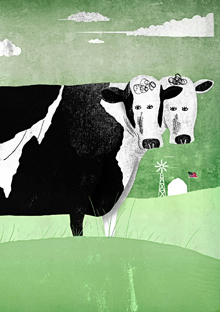How Safe Is Our New Food Technology?

Illustration: Richard Mia
Europeans have said no to food technology we've embraced. So, how safe is it?
Six weeks of vacation. National healthcare. A tolerance for philandering politicians. In general, Europeans exhibit more liberal tendencies than Americans. But when it comes to the purity of their food, they are far more conservative. The European Union has banned—or required labeling on—foods whose production involves genetic modification or irradiation, for example, while the United States has largely embraced these innovations. "The EU prioritizes consumer health and consumers' right to know what's in their food," says Michael K. Hansen, PhD, a senior scientist with the Consumers Union, a nonprofit independent testing and advocacy group for product safety based in New York. For example, with genetically engineered foods, the EU requires government safety testing.
Of course, it's not as if safety is disregarded in the U.S.: The FDA—overburdened though it may be—evaluates new technologies and ingredients carefully before allowing their widespread use. But the government relies primarily on evidence supplied by food manufacturers themselves. America's approach is driven by a desire to produce inexpensive food on a large scale, says Hansen, while Europe's stance reflects a reverence for local food and old-fashioned farming.
Next: How you can make an informed decision at the supermarket



